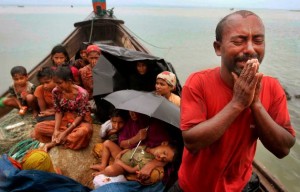ASEAN Parliamentarians for Human Rights (APHR) today criticized Indonesia’s approach to dealing with the influx of migrants in the midst of an escalating regional refugee crisis.
JAKARTA – ASEAN Parliamentarians for Human Rights (APHR) today criticized Indonesia’s approach to dealing with the influx of migrants in the midst of an escalating regional refugee crisis.
The condemnation follows Indonesian authorities’ decision to tow a boat carrying around 400 migrants from Myanmar and Bangladesh back into international waters after it arrived off the coast of Aceh province early Monday morning.
“Towing migrants out to sea and declaring that they aren’t your problem anymore is not a solution to the wider regional crisis,” said APHR Chairperson Charles Santiago, a member of parliament in Malaysia. “Any solution must include securing binding commitments from Myanmar to end the persecution of Rohingya that is fueling their exodus. Furthermore, Indonesia’s actions are fundamentally inhumane and ignore the urgent humanitarian needs of those on board the boats.”
Thousands of Rohingya and Bangladeshi migrants remain stranded at sea following a crackdown on human trafficking in Thailand, which has led traffickers to cast adrift boatloads of their victims without basic food and supplies. Many have ended up in neighboring states, including Indonesia.
“In the short term, Indonesian authorities have a duty to provide assistance to these migrants,” Santiago said. “Many of them are asylum seekers fleeing persecution and disastrous conditions in Myanmar. At the very least, they must be given access to a UN refugee screening process and dealt with accordingly.”
The events have highlighted the alarmingly inept regional response to the longstanding refugee problem. ASEAN still lacks a regional framework on refugees, and only two of ten ASEAN member states have signed onto the UN Refugee Convention.
APHR reiterated its call for ASEAN to remedy these problems and address the growing refugee crisis at the regional level. The Myanmar government must be held accountable for the systematic persecution of Rohingya that has led to a sustained exodus of refugees over the past three years.
“Indonesia’s most recent move follows a long pattern of unproductive and morally unacceptable policies pursued by it and other states,” Santiago argued. “ASEAN needs to find a unified and durable solution to this problem. Ignoring it will not make it go away.”
The collective of lawmakers has consistently demanded that ASEAN abandon its destructive policy of non-interference and engage proactively to mitigate the humanitarian catastrophe unfolding in Myanmar’s Rakhine State.
“These problems are connected,” said Santiago. “If Indonesia does not want refugees turning up on its shores, then it must join other states in the region in pressing the government of Myanmar to end the persecution of Rohingya.”
Source : www.aseanmp.org


